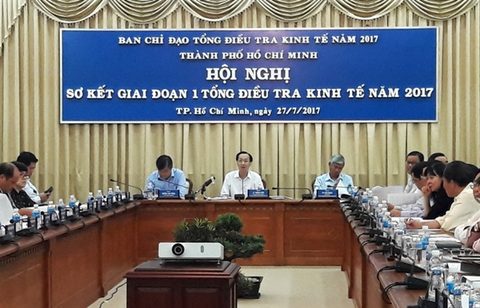HCM City has received more than 80 per cent of questionnaires from enterprises, the highest rate in recent years, after four months of gathering data for the first phase of the 2017 economic census.

Le Thanh Liem, deputy chairman of the HCM City People’s Committee and head of the city’s Steering Committee for the Economic Census 2017, speaks at a meeting to review the first phase of the census.
The first phase, conducted from March 1 to May 30, surveyed production and business establishments, administrative offices, branches and representative offices of foreign enterprises, and foreign non-governmental organisations.
Collected data showed a significant increase in the number of individually-owned and household businesses, with a combined total of more than 448,000, compared to 200,000 listed in a report from the city’s Taxation Department and Department of Planning and Investment.
The increase in number was attributed to room rental services offered by individual households.
Le Thanh Liem, deputy chairman of the People’s Committee, said taxation and statistics agencies would be asked to review these figures as individual and household businesses play a significant role in economic development and must be better managed by local authorities.
As of the end of 2016, the city had 196,500 businesses. Of the number, 160,560 were still operating and 20,400 had closed, the census found.
Nearly 14,050 businesses were waiting to be dissolved and 1,620 could not be located, city officials said at a meeting last week to review the first phase of the census.
A representative from the city’s Statistics Office said information would be collected about production and trading activities in 2016 as part of an investigation of active businesses. The department also planned to investigate businesses that had halted operations.
Though 115,000 businesses registered to open in early 2017, taxation and statistics agencies have not been able to locate them.
The city’s Steering Committee for the Economic Census 2017 has asked the city to verify the existence of these businesses.
As of July 24, the city’s People’s Committee had sent questionnaires to 173,590 enterprises and collected 141,480, accounting for 81.5 per cent, higher than the average of 72-75 per cent in previous years.
Lack of co-operation
Though the rate of return of the questionnaires was higher this year, some districts said that many enterprises were uncooperative.
The statistics office in District 9, for example, said that only 4,000 of more than 5,000 invited enterprises had taken part in training for the census.
The head of the statistics office said the number of returned questionnaires was small, even though local authorities had sent people to collect the documents at enterprises’ premises.
“Many enterprises did not return the questionnaires despite being reminded several times,” the head of the statistics office said. “In some cases, directors of the enterprises signed the questionnaires without filling in any information.”
Representatives from District 2 and Tan Binh and Binh Thanh districts also complained, saying that the attitude of enterprises had hindered data collection.
District 1, which has the highest number of enterprises in the city, reported only 77 per cent of returned questionnaires.
It found that 3,100 enterprises were located at different addresses from the ones initially registered with the city.
“There are more than 2,550 enterprises we cannot locate. This is a big problem. We weren’t aware of this until we began the census,” a representative from District 1 said.
Liem said that it was necessary to have better and more complete answers on the questionnaires, and if standards were not met, the enterprises must redo them.
“Only by doing this can data be correct and reflect the real situation of the city’s economy,” he added.
The economic census, which is carried out in two phases, helps officials assess socio-economic development and assists the Party and State in creating development policies.
The census includes information about economic establishments, labourers’ incomes, production and business activities, and enterprises’ technological applications and their access to loans.
During the second phase, from July 1-30, information was collected from religious and belief establishments, and individual non-agricultural, fishery and forestry business and production establishments.
Preliminary data will be released in December 2017, while the official results will be announced in the third quarter of 2018.
VNS